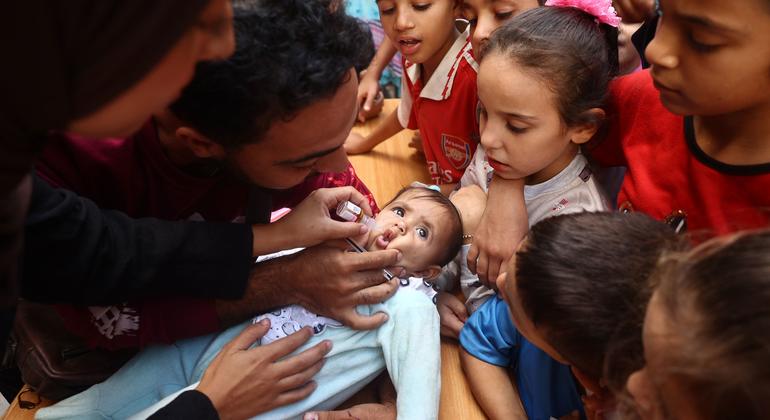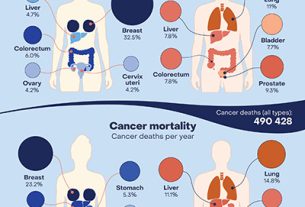Estimates indicate one in five children under three are either zero-dose or have missed vaccinations because of the war, putting them at risk of vaccine-preventable disease outbreaks.
The catch-up campaign aims to inoculate these children against measles, mumps, and rubella, diphtheria, tetanus, pertussis, hepatitis B, tuberculosis, polio, rotavirus and pneumonia.
It will be carried out by the UN Children’s Fund (UNICEF), the UN Palestine refugee agency, UNRWA, the World Health Organization (WHO) and partners, in collaboration with the Gaza Ministry of Health.
‘A moral imperative’
To help address the devastating impacts of the conflict on children’s health and nutrition, UNICEF and partners will also screen children for malnutrition and ensure that those who have the condition receive treatment and ongoing follow-up.
“After two years of relentless violence that claimed the lives of more than 20,000 children in the Gaza Strip, we finally have an opportunity to protect those who survived,” said Jonathan Veitch, UNICEF Special Representative in the State of Palestine.
“Vaccinating every child, and supporting their health and nutrition, is not just a humanitarian intervention; it is a moral imperative. It is how we safeguard the future of children born into catastrophe and begin to rebuild hope in the midst of devastation.”
Hundreds of workers trained
The campaign will be implemented in three rounds, beginning 9 to 18 November.
More than 450 health workers and support staff have been trained to support vaccination efforts.
Additionally, 149 medical doctors have been trained to recognize, report and investigate any health concerns post immunisation – though such cases are extremely rare.
‘Much more is needed’
“This immunisation campaign is a lifeline, protecting children’s health and restoring hope for the future,” said Dr. Richard Peeperkorn, WHO Representative in the occupied Palestinian territory.
He stressed, however, that “much more is needed, and WHO is working to rebuild Gaza’s fragile health system so every child, every community, can access the care they deserve.”
Before the conflict, Gaza maintained 54 immunization facilities. It was also among the world’s leaders in childhood vaccination coverage, with a 98 per cent rate.
Today, 31 immunisation facilities are no longer operational, having been damaged or destroyed in indiscriminate attacks, while routine vaccination coverage is now below 70 per cent.
The final two phases of the campaign, which aim to provide children with their second and third doses of the vaccines, are planned for December and January.
In 2024, the UN and partners launched a mass campaign across the Gaza Strip to vaccinate children against polio.
Gazans receive blankets from the UN as winter approaches in the enclave.
Humanitarian scale-up continues
Meanwhile, humanitarians continue to reach more people every day in Gaza, despite access restrictions, bureaucratic hurdles and other impediments, UN Deputy Spokesperson Farhan Haq said on Wednesday in New York.
The UN and partners have supported a scale-up in daily meals being served by 183 community kitchens across the Strip, which topped 1.2 million meals on Monday.
This represents an increase of more than 80 per cent compared with September.
Humanitarians are also providing families with food parcels and other forms of food assistance. They are also working to improve access to water supplies, with more than 40 partner organizations operating nearly 1,900 water points.
Over the past few days, some 4,400 hygiene kits, 2,900 buckets, 3,700 jerrycans along with hundreds of tarpaulins and tents were distributed to people in need. Displaced families also received cash voucher assistance for clothing ahead of the winter.
Aid on the move
The UN and partners also keep moving cargo into Gaza and collecting more supplies from border crossings.
“On Monday, we were able to offload over 180 truckloads of critical supplies at the crossings, including more than 1,500 metric tonnes of food,” said Mr. Haq.
“And yesterday, our teams collected about 120 truckloads inside Gaza, carrying more than 580 pallets of blankets, tents, winter clothes, hygiene items and more.”
Teams also collected over 150,000 litres of fuel and over 90 metric tonnes of animal fodder.
Mr. Haq noted that although the humanitarian scale-up in is well underway, much more is needed.
“The UN and our partners are actively engaging with relevant authorities and all those with influence to secure the lifting of obstacles and restrictions so that we can truly leave no one behind,” he said.



